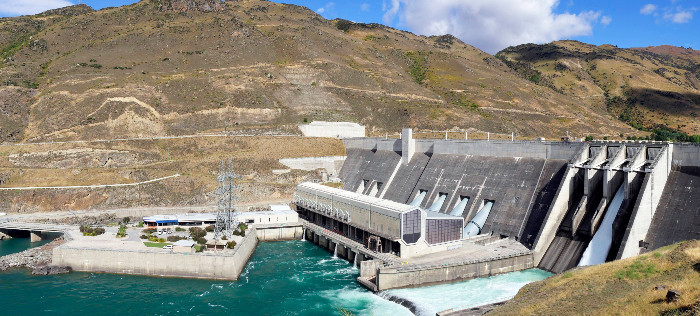Rapid antigen testing trial at Clyde Dam
Rowan Schindler
05 November 2021, 4:16 PM
 Contact Energy will trail rapid antigen testing at its Clyde Dam site.
Contact Energy will trail rapid antigen testing at its Clyde Dam site. A shipment of 300,000 rapid antigen tests has arrived in New Zealand and is now being rolled out across some of the country’s largest businesses, including Contact Energy’s Clyde Dam site.
The rapid antigen tests (RAT) are part of a Government-approved trial to expand the tools used to find and stamp out COVID-19.
The trial begins this week with 29 businesses across a range of sectors, after the 300,000 tests arrived in Auckland late last week from Australia.
As Associate Minister of Health and Research, Science and Innovation Ayesha Verrall announced last week, the initial focus of the trial will be on large businesses, including airports, energy producers, food manufacturers and retirement homes.
The Government, MBIE, the Ministry of Health and the trial businesses are working at pace to determine how this testing can be used more widely across other New Zealand businesses.
Speaking to The Central App, a Contact Energy spokesperson says the Clyde Dam site will be among the first to roll out the antigen tests.
“We are still working up the details of how we will run the trial within Contact but can confirm we are running a trial of the RAT at Clyde,” the spokesperson says.
Contact confirmed their customer service office in Levin and at their Geothermal Power Station Construction Project in Taupo are also part of the RAT programme.
“These three locations represent quite different working and site scenarios that allow us to test the practicality of testing as well as their effectiveness as another tool in the fight against COVID-19.
“Whilst our main focus remains on the encouraging our staff to be fully vaccinated, as that is the best tool in our armoury, access to RAT testing will be an extremely helpful additional tool to keep all those on our sites healthy and to help keep our people safe, and keep our essential sites and works COVID-free.”
“We are very pleased the Government has given us and other companies the green light to trial rapid antigen testing for Covid19 on work sites,” the spokesperson says.
“RAT tests provide results within minutes, and will enable rapid screening before people enter worksites.
“This minimises the potential for infected individuals entering the worksite and the consequent need to institute self-isolation pending test results for the rest of the workforce at the site.
“We can minimise impacts to our essential workforce by using the RAT.
The spokesperson says she could not confirm the exact number of Contact workers who have been partially or fully vaccinated.
“We aren’t doing site specific breakdowns of vaccinations currently. However over 90% of our people have told us they have received - or intend to receive – their double vaccinations.
“It’s tricky to get an ‘official’ record of the numbers as we know not everyone has got around to letting us know (and it is voluntary to do so of course) but we will keep encouraging people to share this information with us.”

Contact Energy staff will undergo rapid antigen testing for COVID-19.
MBIE Deputy Chief Executive Te Whakatairanga Service Delivery Suzanne Stew says the trial will allow participating businesses to roll out rapid antigen testing in the workplace to help them meet their health and safety obligations, to give their staff confidence they’re working in a safe environment, and to support the COVID-19 economic recovery.
“The swift arrival of the tests means we can now make real progress with the trial. It’s encouraging to see the collaborative process between government agencies and the private sector working so effectively,” she says.
“Using real time insights and experience of this business group, together we can look at how we can expand rapid antigen testing successfully for other businesses across New Zealand,” Suzanne says.
“This is about giving businesses another tool in their health and safety toolkit.”
Earlier this month, 29 businesses came together as a collective to ask the Government if they could import rapid antigen tests.
MBIE and the Ministry of Health then worked at pace with the trial businesses to find a way to make testing available that was relevant for New Zealand businesses.
The 29 businesses have signed up to a charter, which will be the foundation for this trial.
“Businesses want to do everything they can to keep their teams safe and well, and rapid testing is another added layer of protection that we can now look to include into our health and safety management protocols,” Auckland Airport Chief Executive Adrian Littlewood says.
“We are delighted to see the tests arrive in the country and our thanks again goes to the Government, MBIE and the Ministry of Health for their speedy response to our request.
“We’re looking forward to getting the trial underway this week with our essential workers.”
Procured by Auckland Airport via medical supplies wholesaler and distributor EBOS Healthcare, the 300,000 Abbott PanBio COVID-19 Ag Ra7pid tests are being funded by the 29 participating businesses.
The rapid antigen tests can provide an indicative result in about 15 minutes, and generally cost about $10 to $15 each.
This allows for much faster results, which helps businesses operate more effectively. Rapid antigen tests tend to be less sensitive at detecting cases, so PCR tests will remain the mainstay of COVID-19 testing in most situations.
Rapid antigen testing is not a replacement for other COVID-19 testing used in New Zealand, or vaccinations. It sits alongside these services to boost New Zealand’s public health response.


